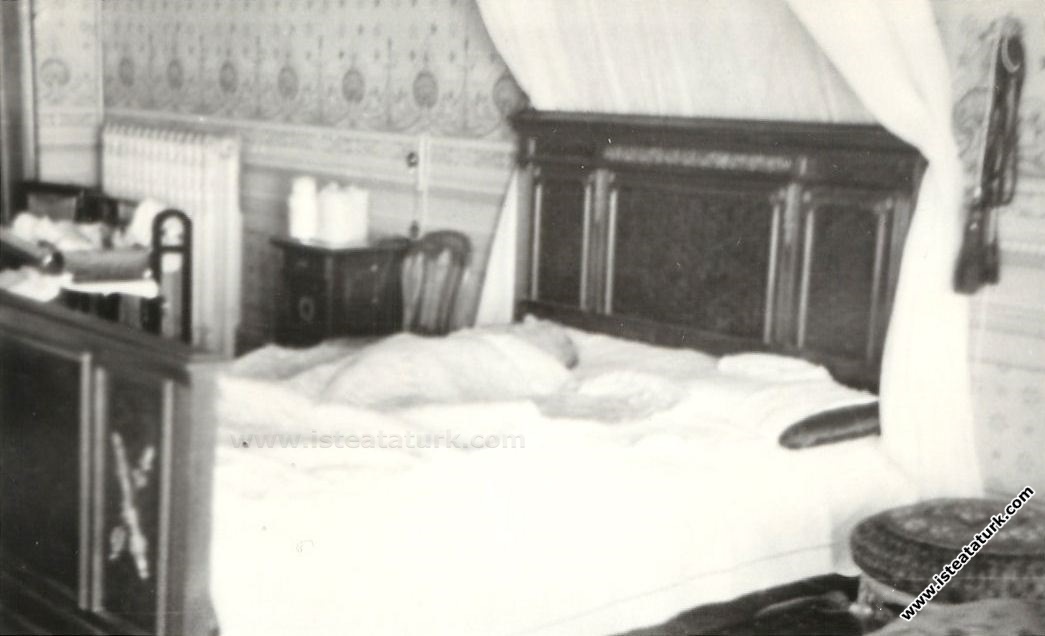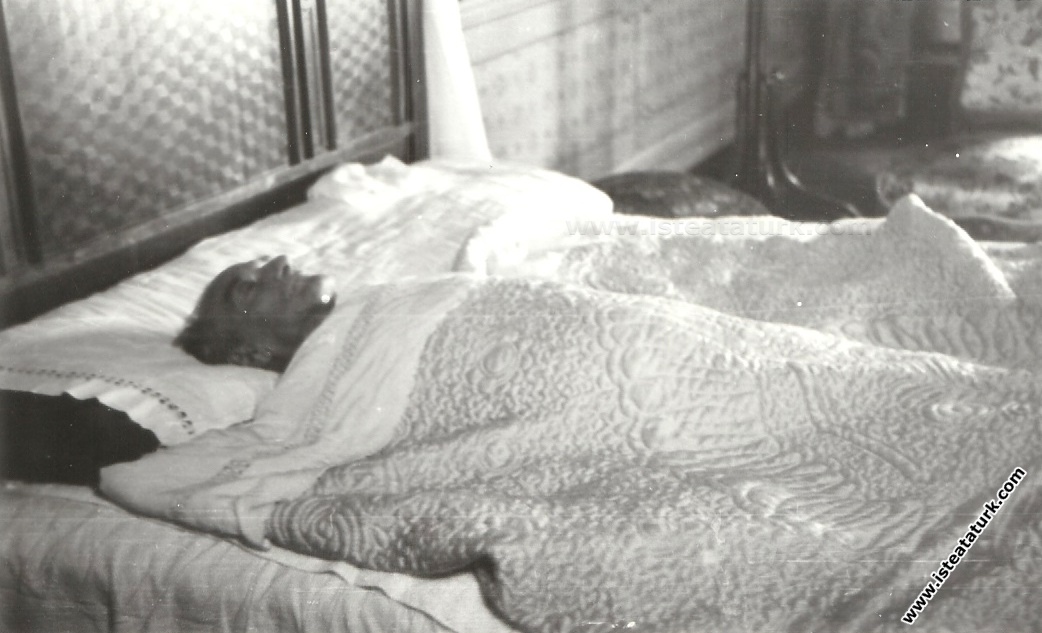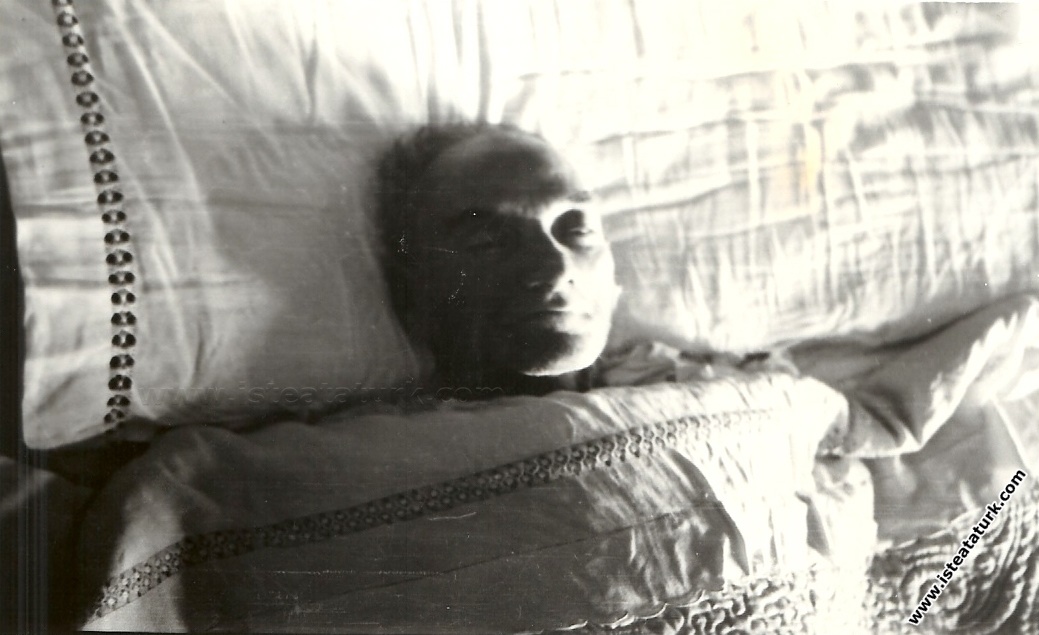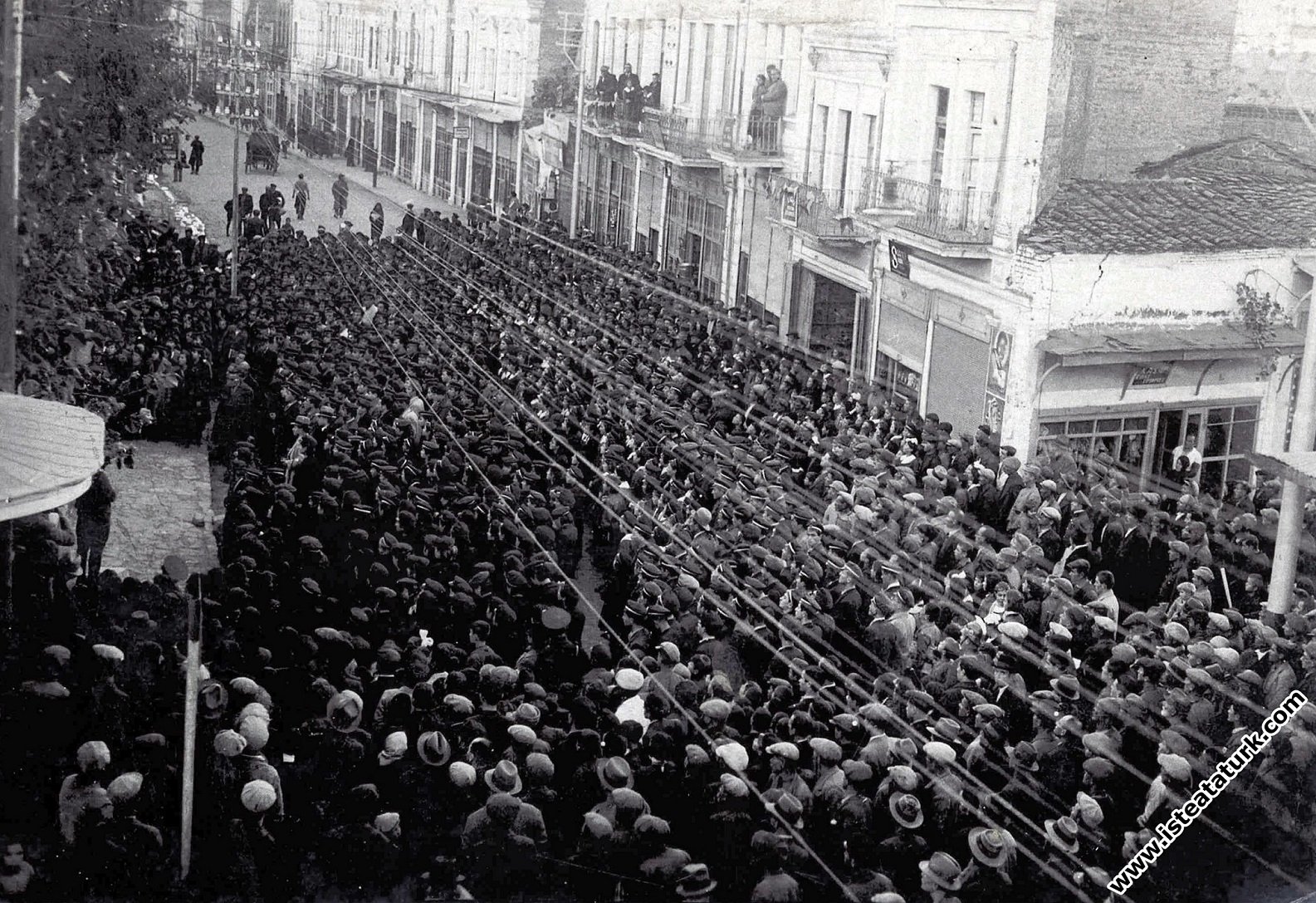Preparation of the Great Leader Atatürk's Will and Closing His Eyes to Life. (05.09.1938)
Preparation of the Great Leader Atatürk's Will and Closing His Eyes to Life. (September 5, 1938)
ATATÜRK'S WILL
Let's listen to how Atatürk's will was drawn up from the then Presidential Secretary General, Hasan Rıza Soyak ;
Ataturk; He considered taking water by piercing his stomach as an important and dangerous operation, and he was afraid that his intestines would be punctured during the operation. It was because of this concern that he wanted to finish the work of issuing a will, which he had been considering for a long time, without further delay.
"I went in with him on a sunny autumn morning in 1938. The big man was lying on his back with his head a little high on his bed. The room was covered with a pale sun. His face was the color of ivory; his beautiful blue eyes, which got bigger as his face got weaker, plunged into the sea and the beaches of Üsküdar.
When he sensed me entering the room, he turned his head towards me; He gestured for me to sit down, pointing to a place at the foot of his bed. He repeated his usual question:
- "What's up?"
In those days, the political atmosphere in Europe was very deteriorated. Atatürk is relieved, arguing that despite public concerns and some dangerous signs, the Germans are yet to be prepared and the Italians are not prepared at all. They were saying that there would be no war that year, and that the conflicts would inevitably be tied by a thread, but it was necessary to wait until 1939 or the years after that.
Over the last twenty-four hours, I have summarized the news of daily affairs. He listened with interest to these news, which confirmed his view, occasionally asking some questions and expressing opinions in short sentences. However, it was clear that he was thoughtful and excited.
When I finished, he extended his right arm towards me. We were helping her with her movements because the doctors forbade her to use force unless it was absolutely necessary. I took his hand and he straightened himself up in his bed. For a few minutes he looked at the sea and the opposite shore. It was clear that he was trying to contain his excitement. I noticed that her long eyelashes were wet when she turned her eyes towards me. She was the only weakness (if it's appropriate to call this lofty tranquility) that she showed me all through her illness. Then she looked ahead and began to speak slowly.
- "It is difficult for me to talk in this way, for you as well, but we have no other choice. We have to talk, kid. You know, we used to talk about a job with you from time to time. There was even a law enacted in it: This testament issue. Today we have to finish it tomorrow. One day anyway. Water will be taken from my stomach. Just in case. One of the intestines may be punctured, there may be another malfunction. I guess I should be cautious . He said that he intended to leave all the movable and immovable properties in his possession to his Party, and ordered me to prepare a will accordingly. He had already expressed this at the Party congress in 1927 and later transferred farms and some buildings to the treasury, as we explained above.
In one of our conversations on the same issue, I stated that this is impossible according to the civil law, that the heirs have reserved shares; As an answer:
He said , "Whatever it is. We must find a solution and make a will as I wish; you should be busy with this .I thought of consulting with the late Mustafa Fevzi Efendi, the great legal scholar, Deputy of Saruhan, and I opened the issue and asked him for his opinion. After examining the issue for a day or two, the late Hodja said:
- "I couldn't find a solution other than to enact a special law for His Excellency Pasha." he said; I immediately presented the situation to Atatürk. And upon his consent, the following law was enacted by the Grand National Assembly:
Accepted Date: 12 June 1933, number: 2307
"Article 1- The dispositions of Gazi Mustafa Kemal within the scope of Article 452 of the Civil Code are exempt from the provision about reserved shares and are valid in all their properties.
Article 2- This law is valid from the date of its publication.
Article 3- Enforcement of the provisions of this law, the Executive Board of Representatives is the official.
After this law was enacted, we neglected the issuance of wills. I confess that this is my great fault. For aught I know; Because of the meaning it carries, I could not afford to issue such a document, and every time it was talked about, I was pushing it forward on occasion.
Atatürk reminded me of these with the words "You know, we used to talk about a job from time to time" .
Now I knew that the days of that dear and precious body in the evil realm were numbered, this very painful truth, and I was already convinced that there was a definite need for the issuance of such a document. Yet I was shaken; Something like a ball bubbled up inside me and blocked my throat, and I answered with difficulty:
- "I am listening to your order just because it is something that we have thought about for a long time; otherwise there is no need for it now. The thing to do is a very simple operation; the danger you have commanded does not exist at all."
As I spoke, he had overcome his excitement and was in complete control:
- "Whatever it is," he said, "let's stop arguing about necessity and do it for sure; make a list of what we have in terms of goods and bring it to me immediately!"
I left the room; I went down to my office. While he was making the list he wanted by looking at the notebooks and records, I found peace too. When I came back to him, I still found him in the same state; He took the list, examined it:
"We will divide these into two, some of them are the ones that we have to keep as long as we are alive, such as money, stocks, the Mansion in Çankaya, and his belongings. Here are the documents we will put in the document we will make; the others, the houses and real estate in other places than Çankaya, will be given to Ankara. We don't give it to local municipalities or other institutions, we'll have it treated!" He commanded and made a note of the principles he thought about the will. He also advised me to be very careful not to let this happen at home (he always used this term for his residence).
Among the principles he dictated, he stated the condition that money and stocks should be remunerated by İşbank, as it was up to that time:
- "Is Bank worked very well under the supervision of Celal Bey (Bayar) and achieved successful results. Celal Bey will always be involved with the Bank as long as he lives, so let's set this record for him!" added the order.
While dictating the article about İsmet İnönü's children:
- He said , "If anything happens to him, his brother won't take care of his children - referring to Hasan Rıza Temelli . "
After the will was opened and published, various unwarranted comments were made on the article belonging to İsmet İnönü's children, and even some rumors were added to these that Atatürk felt the need to make such a will because we were told that İnönü was dead before.
The truth is this: Atatürk was a very brave and loyal person who wanted everyone's well-being, worked for it, knew how to carefully distinguish between political necessities and private relations, and was sincerely devoted to his friendships and friendships; On the other hand, İnönü was suffering from a dangerous disease such as gallbladder inflammation at that time and Atatürk was very interested in it. By his order, we received information about his sanitary condition every day and presented it to him; In fact, when his illness coincided with his time, Prof. He also sent Fissenger to Ankara and took care of his treatment.
A copy of the reports we sent to the Prime Ministry on Atatürk's sanitary condition was also given to İnönü by his order; in this way, they regularly received information about each other. From time to time, they also exchanged letters in my vehicle. As an example, I am giving below a copy of a letter that İnönü wrote to me in August, which is the only letter I have from that time.
Dear Soyak;
The news I got from Istanbul is very pleasing. Thank God, Atatürk's fever has subsided. It will regain its strength in a few days. An exciting joy began again in our life; thank god.
Dr. Aras brought me Atatürk's worldly greetings. I would like to present my deepest condolences to Atatürk and my most sincere wishes of well-being. I would like to thank you very much if you would present it to their exalted presence at a suitable opportunity. With love, greetings.
Ismet Inonu
I immediately presented this to Atatürk, and upon his order, I gave a reply expressing gratitude, affection and goodwill.
It was necessary to determine the most appropriate legal form for the will, and to prepare the principles that they dictated in the most appropriate manner and in draft form. I needed to consult with a lawyer friend about this issue.
I thought, the late Kocaeli Deputy, Selahaddin Judgment came to my mind; Atatürk also knew, appreciated and loved him. I phoned him; As we agreed, we met that night on the terrace of the Suna cafe in Osmanbey (later this building was demolished and replaced by the "Yasan" apartment and bazaar). Together we examined the provisions of the law on this issue; We found it appropriate to write the will with his own hand and to submit it to a notary public in a sealed envelope. We were going to have this duty done by İsmail Kunter, the 6th notary public at that time, with the advice of Selahaddin Adalet. İsmail Kunter was a member of the Court of Appeals, a venerable person who had just transferred to the notary public.
The issue is Prof. I also opened it to Neşet Ömer İrdelp. We agreed that he should introduce the notary public as an old doctor friend he brought for consultation.
We also prepared a draft with Saladin. I taped it in capital letters and presented our decision to Atatürk the next morning with the manuscript.
After reading carefully:
He said , "Let's write immediately, close the door, no one can come in . " He sat up and sat on the bed; he took the free-standing dining table in front of him, using it as a writing desk; He began to write, looking at the manuscript from time to time.
I was standing on the right side of the bed, watching him with great excitement and sadness; it was very quiet. I've been browsing through your posts from time to time; He both wrote and changed some words, shortening and simplifying sentences without harming their meanings.
His incomparable judgment and grace were evident here as well; He was thinking very carefully. For example, in one article, the surnames of five of the women he bequeathed to receive a pension were written; only Mrs. Afet did not have a surname; She didn't use her family's last name, she. It had not yet taken any other name; When she saw this, she didn't write the other people's last names.
In the same article, there was the phrase "as much as their death"; instead he recorded: "As long as they live"; According to him, living was essential, and he did not find it appropriate to talk about the death of a person, even in a will, in terms of kindness and benevolence.
The article pertaining to the house where his nurse lived in Çankaya stated: "He will be allowed to reside"; changed it to: "At your disposal". As the minutes passed, my excitement increased; The thought of being the sole witness of this historical event shook me; I felt like I was going to stumble and fall. Maybe to give myself a little time to breathe, I muttered:
"If you're tired, stop; you'll continue in a few hours." He replied calmly but firmly:
"No no, we started, let's finish!"
To leave halfway through, to leave the job unfinished. It was something he did not know, did not know in his life; continued and finished. To me:
Don't forget to correct the draft accordingly!” he said, and I took the draft and corrected it right there. The will took the following form:
.jpg)
Ataturk's Will
Dolmabahce :5-IX-1938
Monday
I leave and testify to the Republican People's Party, my movable and real estate property in Çankaya, with all the nukuts and stocks that I own, under the following conditions:
1. Nukut and its shares will be profited by İşbank as it is now.
2. As every year, as long as their honor is preserved, a thousand liras will be given to Makbule, 800 liras to Afet, 600 liras to Sabiha Gökçen, 200 liras to Ülkü, and the current hundred liras to Rukiye and Nebile as long as they live.
3. Sabiha Gökçen will be able to buy a house and additional money will be given.
4. As long as Makbule lives, her house in Çankaya will remain at her disposal.
5. Children of İsmet İnönü will be given help to complete their higher education.
6. Every year, half of the remaining amount will be allocated to the Turkish History and Language Institutions.
Now that we were done, he took what he had written, put it in an envelope and closed it; He placed it in the drawer of his nightstand.
After that, we talked all along during the 15-20 minutes I stayed with him; He made the following opinion by bringing a December word to the Head of State:
- "Of course, only the nation and its representative, the Turkish Grand National Assembly, have the right to speak and choose in this matter; only I will express my opinion on this issue. First of all, İsmet Pasha comes to mind; yes! It seems that he could not win, so his situation must not be very attractive. There is also Marshal Fevzi Çakmak, who has both served the country greatly, got on well with everyone, always values the opinions of those in authority; he is not in dispute with anyone. He is the most suitable friend for the Presidency. In fact, he likes to deal with army affairs, maybe he does not want to leave the army. But since he will also be in the position of Commander-in-Chief in the Presidency, there is always the opportunity to continue this occupation;I think it would be great if he finds a legal way and is shown a candidate and elected."
We talked a little more on this subject; I understood from his words that he does not like İsmet Pasha's intolerance of criticism, the inadequacy of tolerance, his efforts to carry out his own desires and ideas in every business by not respecting the titles and rights of his friends who are authorized and responsible both in the government and at the head of the Party, sometimes even not at all. It is worried that it will lead the country to some chief administrations in Europe at that time, completely contrary to the goal, which has been aimed and struggled to reach since the first day. It was obvious that; Not forgetting the fascist principles of the regulation and program I explained above, which was prepared by the late Recep Peker to be proposed to the last congress of the Party and signed by İsmet Pasha after he returned from a European trip,
As soon as İnönü assumed the Presidency, without any serious reason or necessity, he declared himself the national chief and the unchangeable president of his party, and his efforts to maintain this state until he hit the strong waves created by the currents of ideas that were taking place in our country as well as in the free world, it is deeply and far-sighted. He proved how right the Big Man was in his concerns.
However, I must immediately add that İnönü showed his skill in keeping our homeland away from the disasters and ruins of the Second World War in foreign policy, and the erroneous path he followed in the domestic administration after 1948, although it was too late, to leave the government, even though it was too late. has started to work to establish an administration worthy of the high level it has reached, by finding its own self again with Atatürk's reforms in the country. In this shake-up and return period, the Prime Minister, the late Prof. I consider it a duty to record Şemsettin Günaltay's valuable activities and services here with gratitude.
In the speech, apart from Atatürk, he touched on politics and briefly:
- "The open, honest and peaceful policy that we have followed so far has been very beneficial to the country. Friends are also used to it. With the exception of real and vital obligations, this policy continues and goes away." he commanded.
We invited Mr. İsmail Kunter, on the day and time he ordered, and he came; I informed him, he asked me to buy some time.
Notary, Prof. Together with Neşet Ömer İrdelp, we waited for a while in the room below the bedroom, meanwhile we prepared a memorandum; When we heard from them, we went upstairs and entered him.
Out of bed, shaved, washed. She was dressed in silk pajamas and a dark red silk robe, and she had tied a cherry-colored scarf around her neck; He was sitting on the chaise longue he had placed in front of the windows on the sea side, smoking a cigarette.
When he saw us, he moved slightly: "Here they are," he said; He made room for all three of us on the chairs he had placed directly in front of him; we sit.
Notary record of the Great Leader Atatürk's Will. (September 6, 1938)
As I remember, he talked with İsmail Kunter about the notary public's presence in Istanbul and the notary law that was newly enacted that year; waited for the brought coffees to be drunk; Then he took the sealed envelope he had placed on the cigarette table in front of him, addressing the notary:
- "This is my will, please act legally when necessary!" he handed it to himself. We got up and left the room together. I paid attention on the way out; He was relieved, as if a great weight had been lifted from his shoulders, his face turned pink.
.jpg)
Notary record of the Great Leader Atatürk's Will. (September 6, 1938)
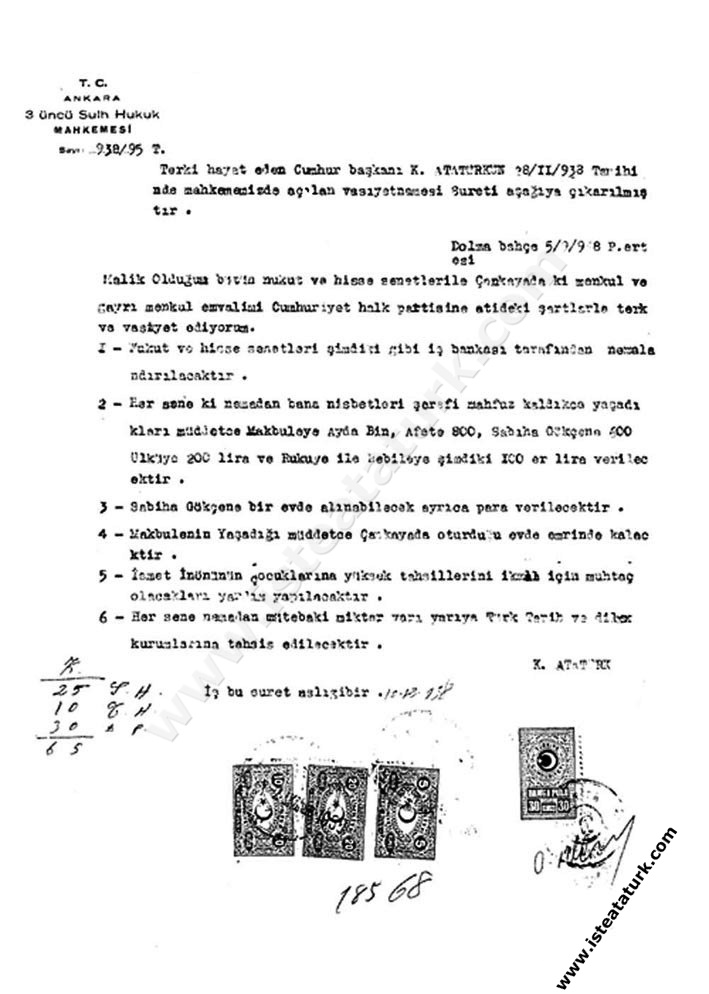
Ankara 3rd Civil Court of Peace Minutes of the Great Leader Atatürk's Will.
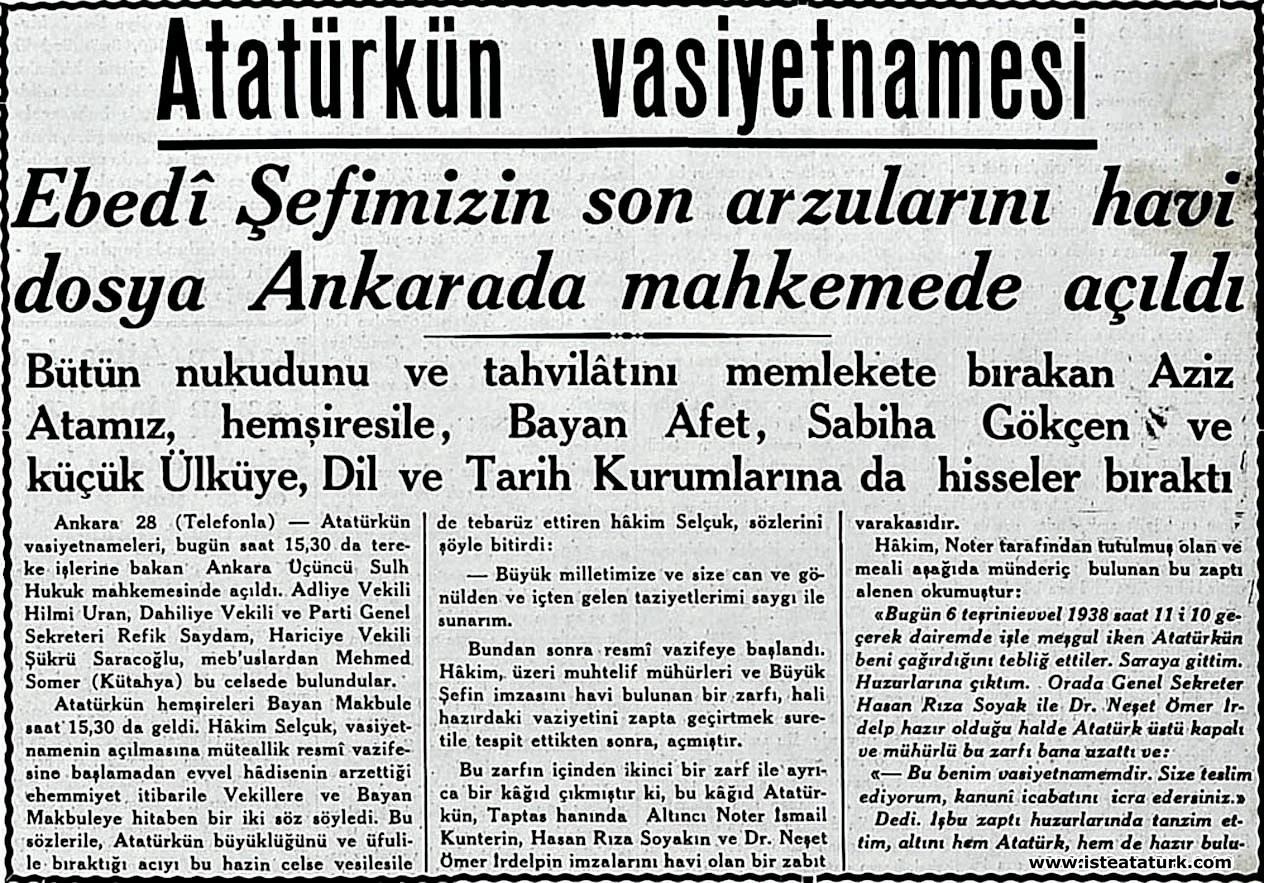
Atatürk's will is in the newspaper headlines.
Source: Atatürk'ten Hatıralar, Hasan Rıza Soyak, Yapı Kredi Yayınları, ISBN: 975-08-0882-7. Sayfa: 712-718
